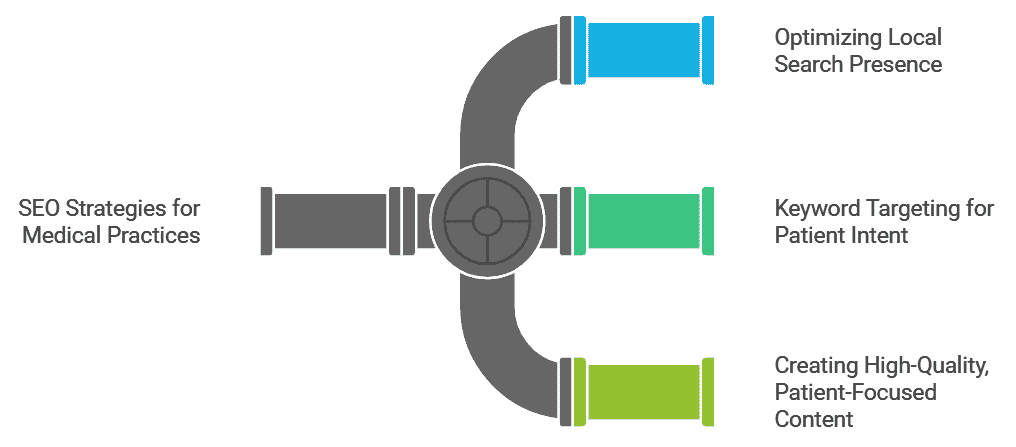In a world where patients increasingly turn to the internet to find healthcare providers, medical practices are seeing the value of strong online marketing. But it’s not just about being online; it’s about being visible. That’s where SEO, or search engine optimization, comes in. For medical practices, SEO is the foundation of any successful digital marketing strategy. Done well, it helps attract new patients, build credibility, and keep your practice top of mind.
Today, we’ll explore the essential SEO insights that can give your practice a competitive edge. If you’ve ever felt like marketing your practice online was complicated or overwhelming, you’re not alone. But with some straightforward strategies, you can make a big difference in your visibility—and patient acquisition.
Why SEO Matters for Medical Practices
When patients need healthcare, their first step is often to search online. Research shows that a large majority of people rely on search engines to find doctors, read reviews, and get answers to medical questions. This behavior makes SEO a critical tool for any practice wanting to reach new patients.
The Role of SEO in Patient Acquisition
Simply put, SEO helps potential patients find you. With the right SEO strategy, your practice’s website ranks higher on search engines like Google, increasing the chances that prospective patients will see it. Imagine someone searching for “pediatric care in [city]” or “cardiologist near me.” When your website appears near the top, it’s more likely that the searcher will click through to learn more about your practice.
Key Benefits of SEO
SEO provides several advantages over traditional marketing methods. First, it’s cost-effective; once your site is optimized, it can keep driving traffic with little ongoing cost. SEO also builds patient trust—when your site appears at the top of search results, it gives the impression that you’re a trusted source in the field. And importantly, it brings in new patients who are actively searching for the services you offer.
Essential SEO Strategies for Medical Practices

Now, let’s dive into some of the core strategies SEO agencies recommend for medical practices.
Optimizing Local Search Presence
Local SEO is essential for practices that serve specific communities. Patients are often looking for providers nearby, so you want to ensure you’re easy to find.
- Google Business Profile (GBP)
Your Google Business Profile is a powerful tool for local SEO. Claim your profile, complete it with accurate information, add your hours, and include photos. This listing helps your practice appear in local search results and Google Maps, making it easy for patients to find you. - Directory Listings
Directory listings, like those on Healthgrades, WebMD, and Vitals, also help with visibility. Patients use these platforms to search for providers, and listing your practice here boosts your credibility and makes you more accessible. - Encouraging Patient Reviews
Positive reviews are incredibly valuable. They build trust with potential patients and improve your standing in local search results. Encourage patients to leave honest reviews on Google and other review sites, and be sure to respond professionally to all feedback.
Keyword Targeting for Patient Intent
Selecting the right keywords means understanding what patients are looking for. SEO agencies often categorize keywords by “intent”—for example, a high-intent search like “urgent care near me” suggests someone looking for immediate care, while a lower-intent search might be more informational.
Use a mix of high- and medium-intent keywords related to your services. Tools like SEMrush and Google’s Keyword Planner are useful for finding keywords that match patient needs and interests.
Creating High-Quality, Patient-Focused Content
Content is at the heart of SEO. Your site’s content should be informative, answer patient questions, and establish your expertise. For instance, you might create blog posts on managing seasonal allergies or tips for maintaining heart health. Educational content like this not only helps with SEO but also positions your practice as a trusted resource.
Building Technical Strength for SEO Success
Technical SEO keeps your website running smoothly and ensures that search engines can “understand” it. This foundation is key for keeping patients on your site and helping you rank higher.
Mobile Optimization
Most searches today are done on mobile devices, so your site must look and work well on phones and tablets. A mobile-friendly site makes it easy for patients to navigate, find contact details, and book appointments on the go.
Website Speed and Performance
Slow websites lose visitors. Patients expect pages to load quickly; if they don’t, they’re likely to leave. Simple fixes like compressing images, reducing redirects, and using browser caching can help boost your site’s speed.
Ensuring Data Security and HIPAA Compliance
Patients want to know that their information is secure. Having a secure site (using HTTPS) and ensuring compliance with HIPAA guidelines shows patients you’re serious about their privacy and helps build trust.
Backlink Strategies for Medical Practices
Backlinks—links from other reputable sites to your own—are a sign of authority to search engines. Quality backlinks improve your search ranking, so here are some smart ways to earn them.
Effective Sources for Medical Practice Backlinks
- Local Partnerships
Partnering with local businesses or community health organizations can earn you backlinks and strengthen your local presence. For example, sponsoring a local wellness event can result in valuable mentions and links back to your website. - Medical Associations
Listings on professional associations and medical organization websites are ideal for backlinks. These sites are trusted by both patients and search engines. - Guest Articles
Writing guest articles or opinion pieces for respected health publications allows you to share your expertise while linking back to your site, building authority and credibility.
Tracking and Measuring SEO Performance

SEO takes time, so tracking your progress is key. You want to see what’s working and adjust as needed. Rather than focusing solely on rankings, pay attention to metrics that reflect patient engagement.
Focus on Patient-Centric Metrics
Metrics like organic traffic (the number of people visiting from search engines) and conversion rates (how many visitors book appointments or fill out contact forms) give a clear picture of your SEO’s effectiveness.
Essential Tools for Monitoring SEO Success
Tools like Google Analytics and Google Search Console help you track site performance, monitor search rankings, and identify areas for improvement.
Embracing SEO Trends and Emerging Practices
As SEO evolves, it’s important to stay current with emerging practices.
- Voice Search Optimization
More patients are using voice search on their phones or smart speakers. Optimizing for conversational queries, like “closest pediatrician” or “24-hour clinic near me,” helps capture these searches. - Leveraging Social Media for SEO
While social media doesn’t directly improve rankings, it drives traffic and can build your brand’s credibility. - Building a Review Strategy
Patient reviews significantly impact your online reputation. Regularly encourage positive reviews and address all feedback to maintain a trusted, patient-friendly image.
The insights above offer a clear path for practices looking to build a strong online presence. SEO isn’t a quick fix, but the rewards are worth it. With the right strategies, your practice can attract more patients, grow trust, and establish itself as a leading provider in the community.
Start with one step at a time—whether it’s optimizing your Google Business Profile or creating content that speaks directly to your patients’ needs. With consistent effort, your practice will see the benefits, both online and in your waiting room.
Effective SEO strategies are essential for driving traffic and enhancing patient engagement in your medical practice. Start optimizing your practice’s online presence to stay ahead of the competition. Boost Your Practice’s Online Presence! Reach out to Karma Health today for expert SEO insights and tailored strategies to grow your medical practice.




